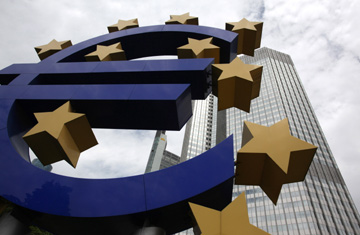
The European Central Bank in Frankfurt
The convulsions that rattled the euro this year — and nearly tore it asunder — were supposed to be a wake-up call for Europe, a sign that it had to fix once and for all the potentially fatal flaws built into its single currency. Caught unawares by the Greek debt crisis, European Union governments eventually pulled together a "shock and awe" $1 billion bailout plan to avert the euro zone's collapse — and then pledged to overhaul their policies to ensure that they would never again be so threatened. However, when E.U. leaders gather in Brussels on Thursday for a major two-day summit, they are likely to be divided on how best to repair the euro and restore confidence in their debt-riddled economies.
In the run-up to the summit, the European Commission called for tough sanctions that would kick in whenever an E.U. nation breached its budgetary limits. These would involve suspending farm and fishing subsidies to any of the 27 E.U. member states that run high debts and deficits, and the 16 countries using the euro would face an additional sanction of a deposit into an interest-bearing account if they persisted in flouting E.U. spending rules. Commission President José Manuel Barroso told the European Parliament last week that "reform of our economic governance is a cornerstone of our sustainable recovery and our credibility."
The proposals aim to overhaul the E.U.'s so-called Stability and Growth Pact, which stipulates that annual budget deficits should be no higher than 3% of GDP and that debt should stay lower than 60% of GDP. The pact has proven largely ineffective in the past decade: although almost all euro-zone members have broken it, no sanctions have ever been applied because governments have been politically reluctant to punish their peers.
Yet despite their inability to shape spending, sanctions — or at least the idea of sanctions — remain an article of faith within the E.U. as a key instrument for dealing with fiscal indiscipline. "It is intuitive that people are fixated on sanctions. They like the idea that deficit sinners would be punished like children," says Clemens Fuest, an economist at Oxford University and the chairman of the German Finance Ministry's Academic Advisory Board. "But sanctions are overrated. They might have changed things with Greece, but they would probably have not changed things in the Irish and Spanish cases."
And while E.U. member states agree that sanctions are the best tools for the job, the members are split on how they should be applied. The Commission's proposals were initially backed by deficit hawks like Germany and key northern member states, which blame unchecked fiscal profligacy for the Greek crisis and say the way to restore market confidence is to force errant governments to mend their ways by repairing their public finances. But in a shock turnaround last week, German Chancellor Angela Merkel agreed to support French President Nicolas Sarkozy's proposal for softer sanctions, which would leave any decision on fines up to a vote by the governments.
Although the softer sanctions include measures to withdraw voting rights from member states that break the rules, the Franco-German deal has stoked fears among E.U. officials of a weakened euro regime, one that could make only toothless threats that would do nothing to discipline spendthrift states. At the same time, the plan sets new legal hurdles: Sarkozy has agreed to Merkel's demand that the measures be written into a new E.U. treaty. Coming less than a year after the long-delayed Lisbon Treaty came into force, this raises the prospect of another round of exhausting and uncertain institutional wrangling within the E.U. Many countries, like the U.K., the Netherlands and Ireland, are bitterly opposed to any treaty change, as is the European Commission. "There is a risk that we will be plunged back into months and years of navel-gazing," warned Luxembourg Foreign Minister Jean Asselborn.
E.U. custom has it that French and German support is a necessary condition for any measure to succeed. But there are serious doubts about Merkel's deal with Sarkozy. Most of the E.U.'s small countries are adamantly against it, and say they are irked by the Franco-German effort to push the softer sanctions through without consultation. Even Merkel's own Foreign Minister, Guido Westerwelle, has opposed it, saying that a strong euro needs hard deficit rules — a notion almost universally shared across Germany.
The argument over what sanctions to apply threatens to overshadow the E.U.'s entire economic-reform package, which aims to improve overall growth and competitiveness. Jean-François Jamet, an economist at the Robert Schuman Foundation, a Paris-based think tank, says the fixation on sanctions has meant that other issues have been ignored. "Sanctions are only one side of the problem," he says. "They aim to deal with issues before they happen, but they do not say much about how to deal with a crisis when it is happening. This is worrying. Greece may get into trouble again in a year or so, and there is uncertainty about how the E.U. would handle such a crisis."
Although the euro debt crisis began rumbling in January, it wasn't until early May that E.U. leaders agreed on their bailout package for Greece and other vulnerable euro-zone members. Now, as they squabble over how to apply sanctions — potentially overlooking other areas of economic urgency — they again risk letting events overtake them when market forces misbehave.
